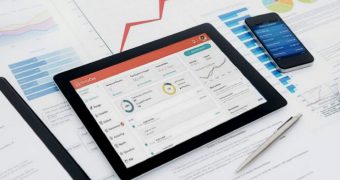Property Management Financial Statements
Monitoring property financial performance and examining the financial statements is one of the most essential tasks for a property manager.
Your portfolio’s financial performance should be reviewed on a monthly basis by the asset manager, director of property management, regional manager, and property manager.
When reviewing financial documents, the Profit and Loss Statement, also known as Income Statement, is one of the most significant among all of the financial documents. It tells you whether revenue is sufficient to pay off all expenses. You can view it within your property management software.

Consolidated Financial Statement – ManageCasa Dashboard
Revenue: Revenue includes both residential and commercial rental income, laundry and vending income, parking fee, tenant charges such as cleaning, damages, lost keys.
Collection Rate: The collection rate is one of the key factors to drive a higher stream of rental income. The collection rate between 95% and 98% is considered acceptable in a typical residential property. Any uncollected rent will eventually be written off and be one of the operational expenses.
Vacancies and Concessions – in some cases, you may provide concessions to motivate future residents to move in sooner in order to minimize building vacancies losses. This strategy is commonly utilized in an economic downturn or rental housing market with high turnover rate.
In our previous article on property management performance metrics, we found that an optimal vacancy rate is less than 3%, while 5% is considered acceptable. A higher turnover rate will possibly lead to a higher vacancy rate which eventually result in higher vacancy losses.

ManageCasa Dashboard – Income Statement Generation
Why Do Vacancy Losses Matter?
For instance, the average monthly rent for a 1-bedroom unit is $1,500 and a 2-bedroom is $2,500. Assume the property consists of five 1-bedroom units and five 2-bedroom units. If the property is fully occupied, the monthly gross potential rent (GPR) is ($1,500 x 5) + ($2,500 x 5) = $20,000 which is equivalent to $240,000 in an annual amount.
If the vacancy rate is 3%, the annual anticipated rental income is $240,000 x 97% = $232,800. Let say the property manager is unable to lease units to future residents timely and the vacancy rate goes up to 10%. The annual anticipated rental income will drop to $216,000.
As you can imagine, the property manager will need to reduce operational expenses in order to offset the loss of revenue and eventually balance the budget. For instance, the property manager may reluctantly reduce repair and maintenance expenses which may cause deferred maintenance and higher capital expenditures in the long run.
Below are expense categories and line items which you may have seen in an operating budget:
Administrative Expenses
- advertising and marketing
- salaries and benefits
- payroll taxes
- office supplies
- accounting services
- legal services
- telephone services
- computer services
- insurance
- worker compensation.
Utilities Expenses
- electricity
- gas
- water
- sewer
Repair and Maintenance
- janitorial supplies
- garbage
- landscaping
- repair supplies
- repair contracts e.g. plumbing, electrical, fire alarm monitoring, fire sprinkler inspection, boiler repair
- elevator maintenance
Financial Expenses
- interest payment
If net operating income (NOI) is negative, the property manager will need to either increase revenue or reduce expenses to balance the operating budget. One of the most direct alternates is to implement rent increases to existing tenants annually and/or during the unit turnover.

Income and Expenses Report Example
However, check with local rent ordinance and/or consult your real estate attorney before you implement rent increases.
Salaries and utilities are the two major expenses when operating property. To reduce utilities expenses, management may enroll the property in energy efficiency or retrofit program as well as replace low-flow fixtures in each rental unit.
While these types of upgrade works may generate savings in long-term, it may also cost capital upfront. Thus, it’s essential for property manager to perform a cost-benefit analysis and research information thoroughly before making management decisions.
See how ManageCasa can help you manage your financials as part of a complete property management solution.

ManageCasa is an elegantly, simplified software solution, perfect for small business landlords. See the full list of features.
Property Management Software | Select Property Software | Saas Property Software | Landlord Software | Commercial Property Management Software | Real Estate Accounting Software | Real Estate Management | Accounting Software | Learn Accounting | Property Management Software Prices | Property Software Comparison | Apartment Management Software | Property Management Trends





